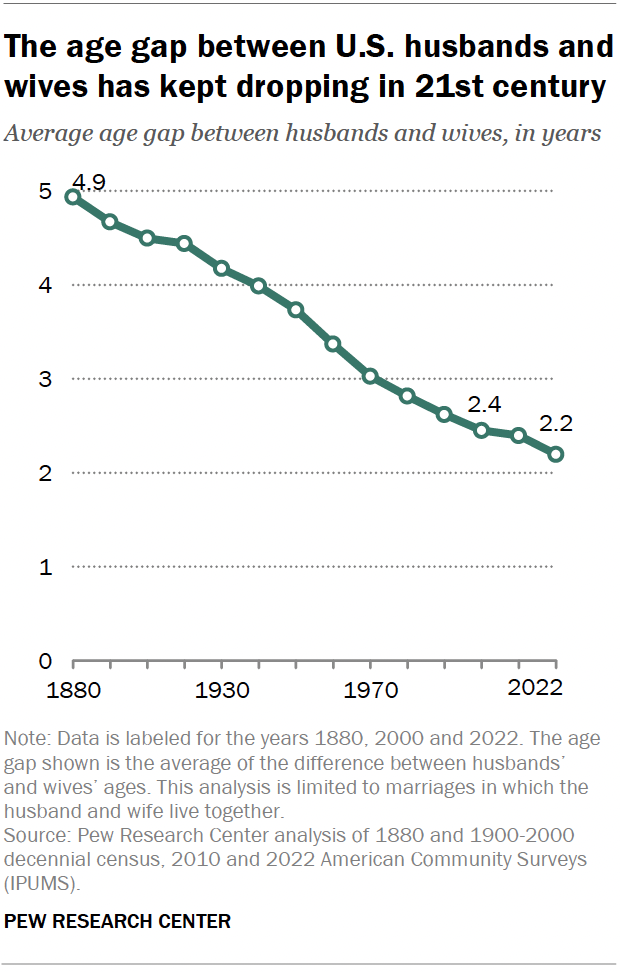Introduction
Hello Wonderful Readers*,
A very contentious topic came up in a conversation with my female friends this week. I discussed with them how I’m single and looking for a partner in bed and in life. But how old is too old? And how young is too young?
When I decided to write about this topic, a cultural icon immediately came to mind: founder and innovator Cindy Gallop. She’s currently 64, and she has shared her sexual preferences and experiences with dating apps publicly:
“I date younger men for sex. I want lots of stamina and very short recovery periods. I don’t get those with men my own age...I was completely honest about everything, including my age…I got an avalanche of responses, which was very good for the ego. 75% of those responses were from younger men.”
Her perspective got me thinking. How common are big age differences in heterosexual relationships? Is Cindy Gallop a lone wolf (or a lone “cougar”) in today’s world? And are relationships with big age gaps less likely to work out?
I dug into the science to answer these questions. While I’ve found some fascinating things, I will say that to get a complete picture, I could have looked at more data from studies on dating apps and whether these findings hold for LGBTQIA couples because these statistics focused solely on heterosexual couples. The reach of my work here is limited, and there’s always room for improvement.
So, let’s dig in!
The State of Age Affairs
There’s a clear trend in heterosexual marriages in the United States: now, more than ever before, husbands and wives are likely to be the same age. According to Pew, the average age difference in the United States was 4.9 years in 1880, 2.4 years in 2000, and 2.2 years in 2022.
In the data below published in 2008, you can see that for marriages in England and Wales (a proxy for “Western” cultures), there is a bell-shaped distribution of the average age differences between couples. Most married couples in recent history have had a husband who is slightly older than the wife. But this is a difference of less than 5 years, and it has been declining since 1963. Indeed, 51% of opposite-sex marriages today have spouses who are two years apart in age or less, which is up from 46% in 2000 (Pew).
Are Relationships with Larger Age Gaps Less Successful?
To answer this question, I looked at large-scale studies on divorce rates by age difference. Of course, divorce rates are not the perfect measurement of relationship success. A couple can fight every day and stay married, which is probably worse than a couple that divorces civilly and stays friends. As Divorce Therapist Oona Metz has shared, “What the new research shows is that conflict is bad for kids.” Ideally, I could have looked at relationship conflict and age differences between couples, but as far as I’m aware, no such data exists.
It turns out that the age difference of a couple is NOT a major predictor of whether the relationship will end in divorce. The bottom line, according to this 2008 study from the National Office of Statistics, is that, at least for now,
“propensity to divorce is not strongly associated with marital age difference at an aggregate level, although further research would be required to control for mortality and any other factors that may affect the risk of divorce.”
Other studies have suggested that in order to interpret these findings fully, researchers would need to disaggregate the data based on whether one of the partners was married before and who initiated the divorce. It’s well known that about two-thirds of divorces are initiated by women, so these divorce statistics may well be skewed toward women’s preferences.
Unfortunately, as I dug into this data, I found a lot of crappy news outlets that totally blew findings from certain studies out of proportion and came to conclusions that were misleading or just plain wrong. One poorly researched article on a website called MarketWatch concludes, “The bigger the age gap, the shorter the marriage.” This is not true. The second source they cited has since redacted an inaccurate chart where they tried to show the increased likelihood of the marriage ending based on the age difference. I smell bullshit! Still, I had to get out my magnifying glass and relearn how to read coefficients from my Statistics classes at Wharton just to determine that this was indeed a shitstorm of statistical insignificance.
As far as we know today, an age difference does not significantly impact the success of a relationship. However, there are a couple more interesting insights below the surface.
Extra Interesting Tidbits: Things To Consider
Male Preferences For Younger Females and Vice Versa
A study conducted by Professor David Buss at UT Austin investigated sex differences in mate preferences in 37 cultures with 10,047 participants. Its findings might partially explain why men are slightly older on average in married couples than women. Their key result was:
“Females were found to value cues to resource acquisition in potential mates more highly than males. Characteristics signaling reproductive capacity were valued more by males than by females.”
Basically, females take more than just physical appearance into account when selecting a mate, as they might want a partner who signals resource acquisition for their potential offspring. Additionally, males might prioritize physical appearance and have a preference for younger females because of “a biological adaptation resulting from the greater potential fertility of younger women” (Office for National Statistics), especially if they want to produce offspring and have a family.
However, this is a generalization and certainly not a rule. There is also a variety of other social trends happening. For example, women’s increased access to education throughout the world has coincided with an increase in the age of marriage. Plus, while women might have preferred older men for their access to financial stability and resources, the gender pay gap is decreasing with more of us females entering and staying in the workforce, so this is becoming less socially relevant. Indeed, among unmarried adults, single women without children now have, on average, as much wealth as single men (Pew).
Until Death Do Us Part: Widowhood & Living Alone
The only reason to be concerned about a large age gap with your partner is whoever is much older is obviously more likely to die sooner, leaving the other person widowed and most likely living alone.
According to Pew, as the share of husbands who are older than their wives has fallen, widowhood for women ages 65 and older has fallen to 30% today, down from 45% in 2000. Given this spousal age gap and the fact that women tend to live longer than men globally, about 20% of women over 60 live in a solo household, compared to about 10% of men (Pew).
Is Everyone Coming to Cougartown?
There’s been a lot of talk about “cougars” in the news, or “age-hypogamy,” where the female is older than the male in a heterosexual relationship. A study released in 2003 by the UK's Office for National Statistics concluded that the proportion of women in England and Wales marrying younger men rose from 15% to 26% between 1963 and 1998. Still, these forms of relationships are rare, even though they are slightly on the rise. By a different definition, “recent US census data has shown an increase in age-hypogamous relationships from 6.4% in 2000 to 7.7% in 2012.” (Wikipedia).
Despite the sensational news, cougars appear to be happier than other females who are in relationships! There is some evidence that “woman-older partners were the most satisfied with and committed to their relationships, relative to woman-younger and similarly aged partners, consistent with socio-cultural predictions” (Psychology of Women Quarterly, 2008). And for all my older, single female readers, there’s evidence that age doesn’t matter to male partners as much as beauty. Yes, unfortunately, you’re still being held to the standard of the male gaze, but being doesn’t matter as much as being good-looking. Is that a plus? I’ll leave that for you to decide.
Second Marriages & Men
Digging through the research, I did find that when a husband is marrying for the second time, his wife is often much younger:
“Some 20% of men who are newly remarried have a wife who is at least 10 years their junior, and another 18% married a woman who is 6-9 years younger. By comparison, just 5% of newlywed men in their first marriage have a spouse who is 10 years younger, and 10% married a woman who is 6-9 years younger.” (Pew)
The “Socially-Acceptable” Cop Out: “Half your age, plus seven.”
I came across this concept during my research. While it will have no impact on whether or not your relationship with someone of a different age will work out, this will help you determine whether or not that age difference is “socially acceptable.” To determine the youngest person who you’re allowed to date, simply use “half your age plus seven.”
So if I’m 29, the youngest person I could foreseeably date without being seen as a complete weirdo is roughly 22 years old. However, studies have shown that this rule applies much more appropriately to the age range that men can date, as opposed to women, which I think checks out. Because unless he is really amazing, dating a 22-year-old guy for me right now would feel very weird indeed.
My Statistically Insignificant Stories
In addition to the more useful statistics of having a partner who is alive and the potential of being happy as an older cougar, here are my not-so-scientific summaries of my experiences dating younger and older men.
Dating Younger Men
Largest Age Difference: 3 years younger than me.
In the last two years, I have dated four guys who were three years younger than me. I enjoy dating younger men, and it didn’t feel like too significant an age difference. Most of them had gotten a decent start in their careers. They were flexible in terms of their life direction, and they felt more malleable to date.
Within this, I noticed some patterns. The younger men I slept with had great bodies and even better stamina, à la Cindy Gallop. They were also more likely to want to go out clubbing, drink heavily, and party party party until the wee hours of the morning (or as they say in Mexico, “la madrugada,” one of my favorite Spanish words). I’m not a total grandma, so sometimes I would go out with them, but I generally prefer not to go too hard or drink too much, lest I want to do anything the day after.
Dating Older Men
Largest Age Difference: 14 years older than me.
In the last year or two, I’ve dated two men who were at least 12 years older than me (aged 42 and 44, I think). Neither of them stuck around for long. The first one was The Photographer, and while age was not a factor in terms of my attraction to him, he was a workaholic who had no intention of ever having a family. He explicitly told me he didn’t want anything serious, and when people tell me who they are, I try to believe them.
The other 44-year-old guy was recent. We met at a very fancy bar in Mexico City. He was short but very well-dressed, and his daddy vibes were hot enough to get me to have dinner with him. The problem with him was that he had two children with two different women. While money wasn’t an issue for him (he worked in hotels and real estate), no matter how much money you have, there are only so many competing baby mamas and children scattered around the city that I want to contend with.
Much unlike the younger men I dated, both of these men seemed more stuck in their ways, with more rigid schedules and lifestyles that I would have to box myself into. Both also either had dead or very old parents, and that was also a turnoff for me, as I’d like my children to be able to meet their grandparents if possible, and I don’t want to start a relationship with one foot already in the grave.
Conclusion
Does age difference matter in relationships? The answer seems to be no. The only potential downside of dating someone much older is the possibility of being widowed at a younger age and then living alone. But I already live alone anyway, so to me, this wouldn’t make a difference.
Whether you’re attracted to people of all ages is a different question. As is somewhat reflected in the statistics, my range of dating men who are older than me is much wider than men who are younger than me. Yet I can imagine that if I’m single, aged 50+, I will want to jump on the cougar bandwagon and get a taste of that potentially more satisfying and committed relationship with a younger man. Whoopee!
Ultimately, I believe that if you both like each other, then none of the other “socially acceptable” bullcrap really matters, and you shouldn’t care what other people think. Don’t try to follow a baseless rule like the “half your age plus seven” method because it won’t make a difference to the success of your relationship anyway. Also, try not to judge other people. Love is love, and as long as no one is committing statutory rape, there’s literally nothing wrong with dating someone with a wild age difference, as far as I’m concerned. And given the other social trends that women are becoming more financially independent, getting better educated, and acquiring more resources of our own, it seems perfectly fit and well that we might want to date men who are younger than us for the same reasons of attractiveness and youth that older men have traditionally sought out in us for ages.
Final Thought
So, my wonderful readers, what do you think? Would you date someone 15 years younger than you or 15 years older than you? Can you be brave and admit you wanted to date someone who was outside the bounds of a “socially acceptable” age difference?
Paid subscribers can battle it out in the comments.
Love to you all, and enjoy the rest of your weekend,
Tash
💌 ✍️
*I am sorry this newsletter is turning more into a Saturday update than a Friday update. I’m trying out a new format this week, and it took me longer than I expected to be able to edit it.












What a great and thought provoking article. I think in terms of age in relationships, it all depends on life goals and what the person want out of life. If a person is looking for 'fun', then the younger age could be right for the moment. If one wants a life partner then someone similar in age, life experience and values is the way to go. I also define similar in age as 5 years older and 5 years younger than a person's age. Overall, it all depends on what a person is looking for.